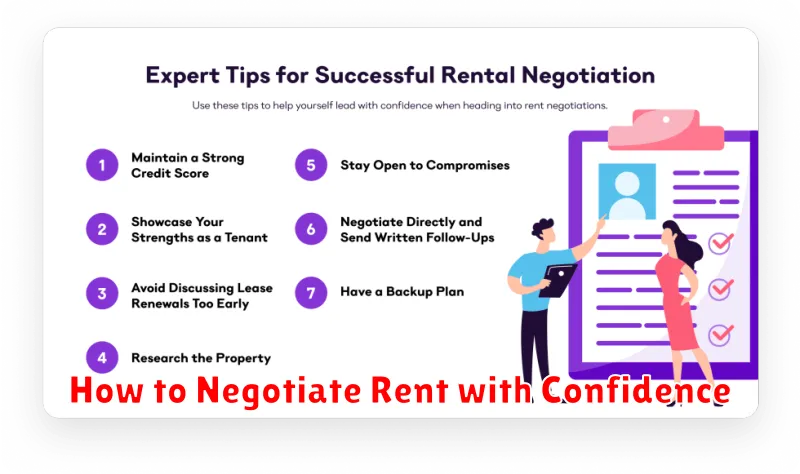Negotiating rent can often feel intimidating, but it’s a crucial skill for any renter. Whether you’re moving into a new apartment or renewing your current lease, understanding how to negotiate rent effectively can save you significant money over time. This article will provide you with the essential tools and strategies you need to confidently approach your landlord and secure a better rental rate. Learn how to research fair market rent, prepare a compelling argument, and navigate the negotiation process with poise and professionalism. Mastering these techniques can empower you to take control of your housing costs and potentially save thousands of dollars.
From understanding your legal rights as a tenant to crafting a persuasive proposal, this guide will equip you with the knowledge and confidence to negotiate rent successfully. We’ll explore various negotiation tactics, including highlighting your positive qualities as a tenant and presenting compelling market data to support your requested rent reduction. By following the advice and techniques outlined in this article, you’ll be well-prepared to negotiate rent with confidence and achieve a more favorable outcome.
Know the Market Rates
Before entering any rent negotiation, thorough research is crucial. Understanding prevailing market rates empowers you to negotiate effectively.
Start by researching similar properties in your area. Consider factors like size, amenities, and location. Online real estate portals and local listings can provide valuable data.
Analyze the data you gather. Look for trends in rental prices. This information will serve as your baseline for determining a fair and reasonable rent.
Knowing the market rate gives you leverage during negotiations. You can confidently counter-offer if the landlord’s initial price is above market value.
Highlight Your Rental History

A positive rental history is a powerful tool in rent negotiations. It demonstrates your reliability as a tenant, which is highly valued by landlords. Be prepared to showcase your history of on-time rent payments, responsible property maintenance, and adherence to lease terms.
If you’ve consistently paid rent on time or even early, emphasize this. Provide documentation if possible, such as bank statements or payment confirmations. A strong track record of timely payments can significantly influence a landlord’s willingness to negotiate.
Furthermore, highlight any positive feedback from previous landlords. If you have written references, offer them to your prospective landlord. Positive testimonials regarding your cleanliness, respect for the property, and good communication can bolster your negotiating position.
Ask for Discounts or Incentives
Once you’ve researched comparable properties and determined a reasonable price range, don’t hesitate to ask for discounts or incentives. Landlords sometimes offer concessions to secure reliable tenants, especially in a competitive market.
Potential discounts could include a reduced monthly rent for a specific period (e.g., the first six months), or a one-time discount off the first month’s rent. You might also inquire about waiving certain fees, such as application or parking fees.
Instead of a direct rent reduction, explore incentives. These could include upgrades to the unit (like new appliances or fresh paint), covered utility costs (water, trash removal), or included amenities (parking space, storage unit).
Be prepared to justify your request. Highlight your strong rental history, stable income, good credit score, or willingness to sign a longer lease. Presenting yourself as a desirable tenant increases your chances of securing a favorable deal.
Offer a Longer Lease Term
One of the most effective negotiating tactics when renting is to offer a longer lease term. Landlords often appreciate the stability of a longer-term tenant, as it reduces vacancy periods and the associated costs of finding new renters.
Proposing a longer lease, such as 18 or 24 months instead of the standard 12, can provide leverage for negotiating a lower monthly rent. Landlords are more likely to be flexible on price in exchange for guaranteed occupancy for an extended period.
Before making this offer, carefully consider your own circumstances and ensure you are prepared to commit to the longer timeframe. Weigh the benefits of a potentially reduced rent against the restrictions of being tied to the property for a longer period.
Be prepared to negotiate the terms of the longer lease. For example, you might discuss options for breaking the lease early if necessary, with predefined penalties or conditions.
Negotiate Before Renewal

Initiating negotiations prior to your lease renewal holds a significant advantage. Landlords are generally more receptive to discussions before a lease expires, as they prefer to retain existing tenants rather than face potential vacancy costs and the effort of finding new renters.
Starting early provides you with ample time to research comparable rental rates in your area and strengthens your negotiating position. It also allows you time to explore alternative housing options should negotiations not yield a desirable outcome. Aim to begin discussions at least two to three months before your current lease term concludes. This timeframe demonstrates proactive engagement and provides ample room for a mutually agreeable resolution.
Presenting a well-researched case with supporting data comparing local rent prices for similar units increases your chances of a successful negotiation. Being prepared with this information empowers you to confidently discuss potential adjustments to your rent.

